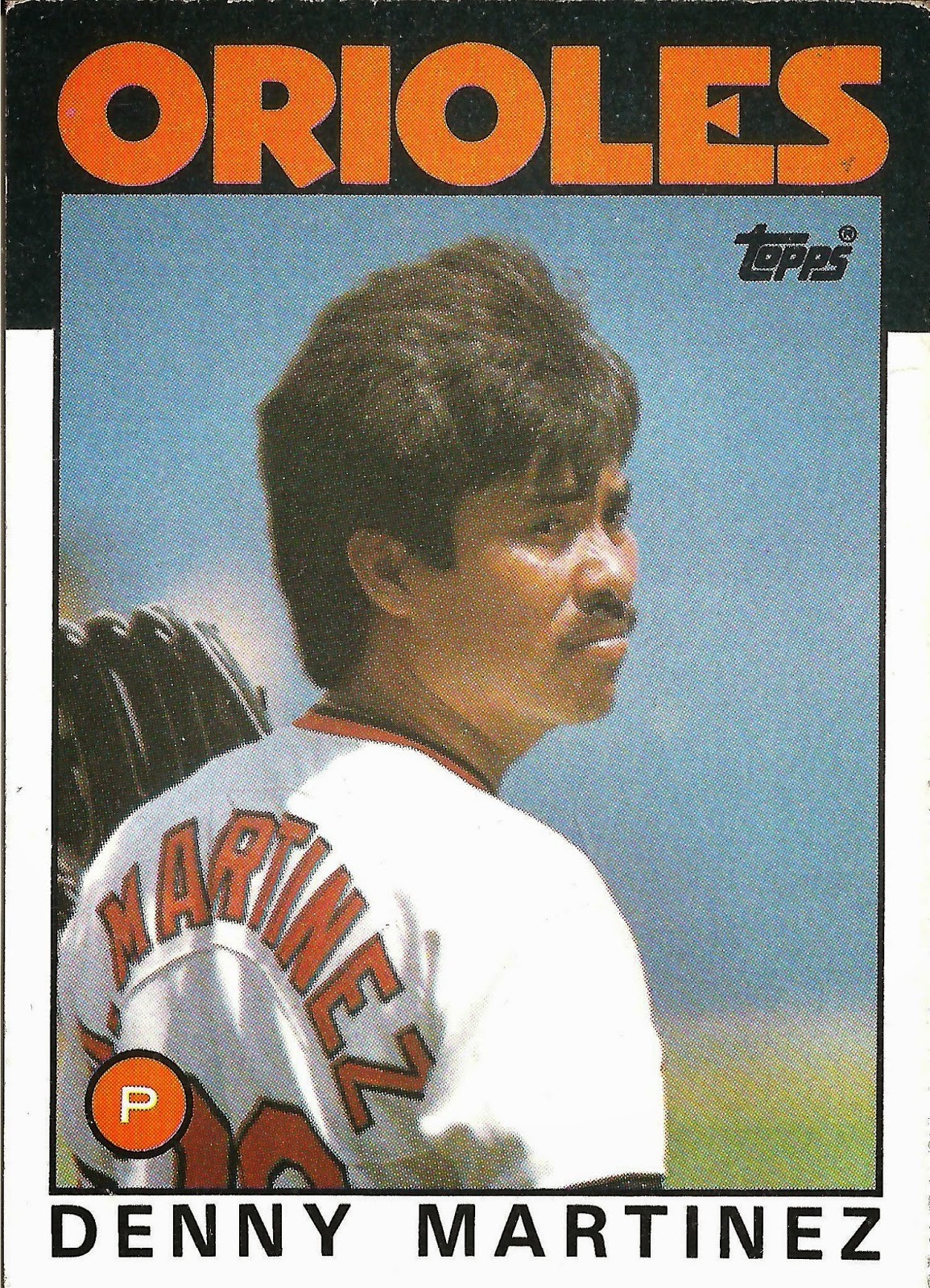Card
thoughts: “Denny” is better known as “Dennis.”
And that is a beautiful thick head of hair!
The
player: Up until this point, Martinez was an
inconsistent starter, whose high win totals were more of a function of his
durability (lots of innings pitched, hence lots of decisions) and the Orioles
team success, rather than his ERAs (consistently average or below). That all
changed later in his career – he was much more effective in his mid-30s once he
came to the National League.
The first Nicaraguan to pitch in the majors,
Martinez came from a relatively wealthy family (his parents owned a farm). But
his father drank, and his son was a “baseball” bum. Baseball was not unknown in
the country (there was a winter league there in the 60s), but there were no
professional teams by the time Dennis was playing. Instead, he pitched for an
amateur league, and was noticed by scouts after going 13-2 and leading the
Nicaraguan national team to the title in the 1972 amateur World Series.
Signed (secretly) by the Orioles after the 1973
series (to enable him to continue playing as an “amateur” in Nicaragua),
Martinez made it to the States in 1975. Due to his experience pitching under
pressure for the Nicaraguan team, Martinez wasn’t cowed by the minors. He
excelled at every stop, jumping quickly from Miami (15-6, 2.06 ERA) to
Rochester, where he led the league in wins (14), strikeouts (140) and ERA
(2.50) in 1976. There were also reports that Martinez partied a lot, which would nearly derail his
career later.
Like most young pitchers in that era, Martinez
apprenticed as a “swing man” with the Orioles in 1977, but he managed to win 14
games in that role (13 starts, 29 relief appearances). He was finally made a
full time starter in 1978, where he used his curve and change to set up his
fastball. But he only achieved modest success that year (16-11), and the next
(15-16). Martinez was durable, however. In each of the years, he pitched over
275 innings, leading the league in starts (39), complete games (18), and innings
pitched (291.2) in the latter year.
Part of his poor performance in 1979 was that he was
tipping his pitches. Apparently, the combination of chewing gum and chaw
Martinez routinely used contributed to distinct facial expressions, depending
on what pitch was going to be thrown. Whatever the reason, the Orioles had a
deep staff that year, and Martinez only started one World Series game, getting
knocked out of the box in the second inning.
A sore shoulder limited him in 1980, but he led the
league in wins during the strike shortened 1981 season (14). This led to a
large contract after the season. However, personal problems began to intrude on
Martinez’ baseball life. His father was killed while drunk at the end of 1982
season. And Dennis began drinking more and more as well. An abysmal 1983 season
(7-16, and ERA well above 5), followed by a drunk driving arrest in the off
season, convinced Martinez to quit drinking. Even so, it would take many years
for Martinez to return to form.
Injured for the first part of the 1986 season,
Martinez was traded to Expos for Rene Gonzales. But he found it hard to crack
the Expos rotation, and he spent part of the year in the minors. When he pitched in the majors, Dennis was
mediocre, and he considered retiring. He was even more down in the dumps in
1987, when he was a free agent, and no one picked him up (of course, this was
the height of collusion). Instead, he had to wait until May to resign with the
Expos. But somehow, Martinez was about
to begin the best stretch of his career at age 33. In the next six years, he
would win 97 games, win the ERA title in 1991, and became to oldest player to
debut in an all star game in 1990.
The secret was that old adage: Martinez had become a
pitcher, rather than a thrower. Relying on guile rather than speed, he would
set up hitters better than he had in his youth, and work on their weaknesses.
It helped that Martinez’ command improved: He rarely walked more than 2 batters
per 9 innings. That control helped him pitch a perfect game
in 1992.
After the 1993 season, despite being 38, he signed a
good contract with the Indians, and up and coming team at the time. Martinez’
veteran presence helped stabilize the locker room, and the rotation. Pitching
less often, he still won at least 9 games every year he was with the Indians,
and never lost more than he won.
A sore elbow led to him pitching sparingly in 1997
(just 9 starts with the Mariners). Martinez ended his career at age 44 for the
Braves, where he actually pitched in a career high 53 games. His 245 career
wins is the most ever by a Latino pitcher.
In retirement, Martinez worked to promote tourism to
Nicaragua and coached in the minors with the Cardinals, Orioles and in the
majors with the Astros.
Rear guard: You wouldn't have known from these stats (.537 winning percentage; 4.15 ERA), that Martinez would soon become one of the most dominant pitchers in baseball.
Less than 4,000 fans saw Martinez pitch a starters worth of relief innings (5 2/3), beating the Tigers when the Orioles roared back from an early 6-0 deficit.


No comments:
Post a Comment